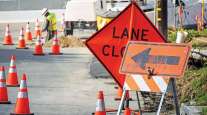Senior Reporter
Transportation Leaders Push Transformative Updates Post-COVID

[Stay on top of transportation news: Get TTNews in your inbox.]
WASHINGTON — Large-scale investments aimed at modernizing the country’s mobility networks would help address connectivity concerns exposed during the pandemic, congressional transportation leaders argue as Congress negotiates a big-ticket infrastructure package.
Democratic lawmakers, assigned to manage the transportation committees, are ramping up calls for the mainstream adoption of technologies that respond to climate change, improve highway safety and facilitate the movement of people and goods.
In championing President Joe Biden’s Build Back Better infrastructure agenda, the Democratic leaders are seeking support from colleagues on transformative updates of last-mile freight distribution centers, ports and waterways, freight rail systems, and the overall surface transportation network.
USDOT-CAP by Transport Topics on Scribd
Rep. Peter DeFazio (D-Ore.), chairman of the Transportation and Infrastructure Committee, is among senior Democrats insisting Congress approve billions of dollars for severe-weather infrastructure resilience programs. He is advocating for long-term investments that build on the momentum set by the federal response to the COVID-19 pandemic.
That response, he pointed out, targeted connectivity zones at airports, rail hubs and transit systems.
“Congress took unprecedented actions to help cushion the economic blow to these transportation sectors. The programs Congress created and the funding it authorized helped transit and bus operators, airlines, airports, and other companies provide paychecks to their employees and essential transportation services to communities across the country,” DeFazio said during a recent hearing, specifically noting the approval of the Coronavirus Economic Relief for Transportation Services (CERTS), which is designed to assist the motor coach industry with payroll and workforce operations.

Pallone
Rep. Frank Pallone (D-N.J.), at the helm of the Energy and Commerce panel, is emphasizing the adoption of electric vehicles, as well as autonomous technology. Pallone said his colleagues should back a multitrillion-dollar social infrastructure package that “invests billions in the creation of a greenhouse gas reduction fund, electric vehicle infrastructure and home energy efficiency rebates.”
With congressional negotiators suggesting the adoption of a $2 trillion social infrastructure Build Back Better package, climate and environmental programs must remain front and center. That is the sentiment from Senate Environment and Public Works Committee Chairman Tom Carper (D-Del.), who remains committed to pushing for environmental justice programs, energy efficiency and clean vehicles, as well as a long-term response to climate change.
Dedicating funds and resources that would amplify the resilience of freight and commuter corridors must remain atop Congress’ agenda, or as he put it during a hearing this month, “The U.S. will continue to face natural disasters of increasing severity and intensity with even more devastating impacts. That’s why we need to rapidly and dramatically reduce our greenhouse gas emissions, while we increase investments in resilience.”

Cantwell
Carper’s colleague, Sen. Maria Cantwell (D-Wash.), the Commerce Committee’s chairwoman, is among policymakers leading a push for funding at the ports that would assist the freight industry with supply chain concerns.
”Congress has caught on that the supply chain is key to our economic strategy, and that a robust supply chain in the United States of America means we’re going to continue to have robust employment,” Cantwell said. “Without the resiliency of the supply chain, our services and security could be impacted.”
The White House has been urging Congress to establish an electric vehicle network, and investments in technologies designed to maximize fuel efficiency across the transportation sector. Responding to myriad reports linking climate change to human activity, the president and his team are advocating for investments that enhance disaster mitigation projects, as well as electric and autonomous vehicles.
Recently, the administration unveiled a plan outlining steps meant to ensure federal facilities and operations have the resilience to withstand the impact of severe weather events. According to the White House on Oct. 7: “Agencies will embed adaptation and resilience planning and implementation throughout their operations and programs, and will continually update their adaptation plans.”
Want more news? Listen to today's daily briefing below or go here for more info:




